How to travel for free: a practical guide
Wondering how to travel for free? Is that even possible? The short answer is YES: you can spend a lot of time on the road without spending any money. But the conditions of this trip will probably not be the same as those of a regular tourist – which could actually be a good thing.
In this article, I’m going to talk about some advantages and disadvantages of traveling for free (or with very little money) and share tips I learned from my own experience and from other travelers I met around the world.
Is it really possible to travel for free?
First of all, I would like to emphasize that I do not believe that “anyone can travel, if they want to”, as some travelers might claim.
Our world is very unequal, and many people do not even have basic rights guaranteed, so traveling for leisure is still a privilege. But it is indeed possible to travel without any money or extremely cheaply, and many people do it.
In this article I will talk you through some of the best strategies for traveling without paying for transportation, accommodation, meals, and tours.
Why travel for free?
In addition to the most obvious reason, which is not being able to save money before hitting the road, there can be other motivations for traveling for free.
I’ve seen people choose to backpack without money because they wanted to renew their faith in humanity, exercise humility, challenge their own limits, leave their comfort zone, criticize capitalism, connect more with people, have a simpler life, experience a deeper immersion in each place, or learn to differentiate what is really necessary from the superfluous things that we are used to having on a daily basis, for instance.
The fact is that traveling without money, or in an extremely economical style, will make you enjoy places in a very different way than a tourist. After all, most traditional tourism attractions involve expenses.
You probably won’t stay in hotels, visit amusement parks, eat in trendy restaurants… But this isn’t necessarily a bad thing, as mass tourism is often harmful to destinations and distances us from the reality of the place and the people who live there. The less money, the more “authentic” your trip tends to be, so to speak.
Challenges of traveling for free
On the other hand, of course there may be several difficulties. It’s challenging not being able to solve problems with money, and over time it can get tiring.
You won’t have as much freedom to come and go as you want, nor as much power of choice. For example, you may have to go a long time without eating or eat something you don’t like or that don’t do you much good just to fill your belly.
You may also have to deal with unpleasant accommodation and transport conditions. And you won’t be able to do everything you want, like having a cold beer on a sunny day or trying the local dishes when you feel like it.
Furthermore, if you are always dependent on other people, there may be safety risks, especially for women traveling alone. Money often facilitates “emergency exits” when we are in an uncomfortable or dangerous situation.
Women who traveled without money
I’ve been traveling for cheap since 2009, and I’ve also met a few women who traveled without any money.
The first one was the Brazilian artist Aline Cambpell, who spent three months traveling around Europe without money in 2013. Apart from the plane tickets from Rio de Janeiro to Amsterdam and from Zurich to Rio, she spent absolutely nothing, and didn’t even have a credit card to emergencies.
Aline told me she got 54 rides and slept in 38 different houses. She had never been to the countries she visited and didn’t know anyone in most of them. She used Couchsurfing a lot and met many people who offered company, transportation, and tours without expecting anything other than the satisfaction of helping. She trusted her intuition, exchanged her art for accommodation and also exchanged many smiles and life stories.
She went through several uncomfortable situations and some scary troubles, but also had several cool experiences such as giving an interview for a Belgian TV program, winning a ticket to Cirque du Soleil, meeting a lady who has lived without money for 20 years, going to a festival of music in Poland, discovering the snow in Switzerland… I interviewed her and read a book written by her (in Portuguese) and was quite impressed.
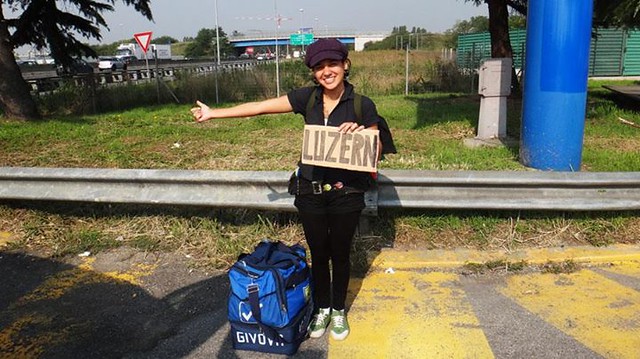
The artist Aline Campbell traveled for free
Another inspiring woman who went on a trip without money was my friend Patrícia Schussel, a photographer who lived as a nomad for about 10 years. A few years ago, she went with a friend from Curitiba to Ushuaia, in Argentine Patagonia, without any money and without bank cards.
For 37 days, they hitchhiked with about 30 different people and suffered cold and hunger. As “currency” they only had some photos taken by them printed in postcard format, which were exchanged along the way.
They also had the help of dozens of generous people, who helped them from providing a brand-new tent to offering accommodation or breakfast. “We had to sleep in the bathroom of a gas station, among many other things, but we had a lot of fun. It was an incredible experience and made me look at things differently”, said Patricia.
In other words: traveling without money can be very challenging, but also very rewarding. Prepare yourself psychologically and check out the following tips – which are also useful for those who want to travel cheap.
How to travel for free (or very cheap)
There are several ways to travel for free. As in these examples I mentioned, you can exchange some skill or talent for whatever you need, for instance.
But I believe that the main thing is to understand that what you REALLY need to travel is:
- Transport to at least one destination
- Accommodation
- Food
Other expenses that travelers tend to incur are not really essential, even though we naturalize them as “embedded” costs in the trip.
I’m going to talk here about some alternatives to get transportation, accommodation, food, and also free tours during the trip. But they all have one basic prerequisite in common: willingness.
If you have a positive attitude, aren’t too demanding, keep a smile on your face whenever possible and put aside shyness, you can travel for free or for cheap and live incredible experiences.
I also believe that for this you need to deconstruct within yourself some concepts about necessity, comfort, and luxury.
How to travel with free transportation
The first expense to consider when thinking about how to travel for free is the answer to the question “how will I get to my destination”? In this case, traveling close to home is the easiest, but it is also possible to go to more distant places for little or no money.
Air miles
If you’re going to travel by plane, the main way to avoid paying for tickets is to use airline miles. To save enough miles you need to make other trips or spend on your credit card, or invest money in loyalty programs.
If you can afford it, it’s worth studying the different airline loyalty programs, and choosing a credit card that has good benefits in accumulated points and using it for all or most of your day-to-day expenses.
Bicycle
Another option, which obviously requires good physical preparation and the investment in the bike itself and some basic gear, is to opt for a bicycle trip. This way, you don’t have to pay tolls and fuel, but you have the freedom to travel on your own.
Carpooling
And there’s the most common way to get around when traveling for free: hitchhiking. You can do this the “traditional” way, going to the road or gas stations to look for drivers who are going in the same direction as you.
Or the “digital” way, such as searching for groups on Facebook that bring together backpackers in general or from a specific destination, who may have the option of arranging rides to popular destinations.
Accommodation to travel for free
Have you safely reached your destination? Excellent! Now you’re going to need a place to sleep. Accommodation is usually one of the biggest expenses on a trip, so guaranteeing this item gives make a great difference for traveling cheap.
These are the main ways to find free accommodation while traveling:
Exchanging work for accommodation
One of my favorite ways to get free accommodation, which allows you to stay longer in each place without worrying about disturbing the host, is by doing a “work exchange”, also referred to as volunteering.
In this scheme, you work a few hours a week (usually between 15 and 30) and get a place to sleep in return, which can be anything from a camping tent to a private suite.
Other benefits may also be included, such as meals, classes, use of bicycles and free tours. I’ve traveled like this a few times and the experiences I had are among the best of my life.
This is a great option for those who want to travel without money, but don’t want to look for a new place to stay every few days.
To find hosts who welcome travelers for a work exchange, I suggest you use Worldpackers, my favorite work exchange platform.
Other options are Workaway, Helpx and WWOOF. I’ve also used Workaway and liked it, but it offers less security than Worldpackers.
These platforms charge a registration fee, which generally lasts one year and costs around 50 USD. But this is a very small investment compared to the savings it can yield.
To learn more about this type of trip, check out my guide on how to do a work exchange.
If you use Worldpackers, by clicking here or entering the discount code JANELASABERTAS on the payment page you save 10 USD on the annual plan, which entitles you to chat with the hosts, close a formal exchange agreement through the platform and access their support and insurance.
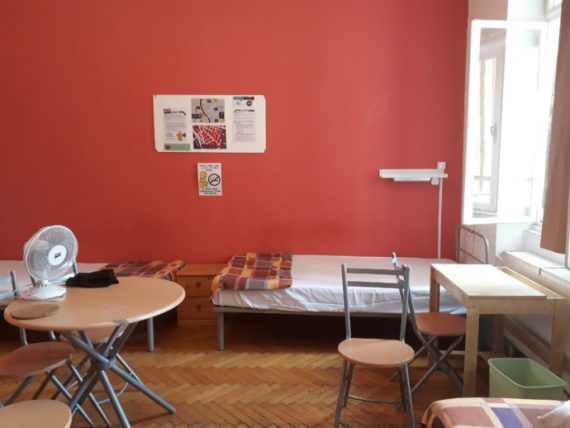
Hostel room where I stayed for free in Budapest through Worldpackers
You can also look for establishments and offer a work exchange on your own, by contacting them directly. I don’t like doing this because I know many stories of exploitation by the host, and I prefer to have access to traveler reviews and other security checks available at Worldpackers. But it’s still an option, especially when you’re already on the road and can go there in person.
Many inns, hostels and hotels are willing to offer some free nights in exchange for producing photos or videos for publicity, for example. And if you have a social media profile with good engagement, it’s also worth offering promotion on your profiles in exchange for a free stay.
However, I recommend having common sense to only partner with places that you really recommend and not promise your partner anything that you cannot deliver.
Couchsurfing
Another option widely used by backpackers is Couchsurfing, a website created to offer and search for free accommodation in people’s homes anywhere in the world.
The idea is to encourage the collaborative spirit of travelers and allow connections between people from different parts of the world. Couchsurfing used to be free, but today they charge a small fee to maintain the platform.
There are also some competitors that offer similar services, and some of them are free of charge. Check out BeWelcome, Trustroots and Warmshowers.
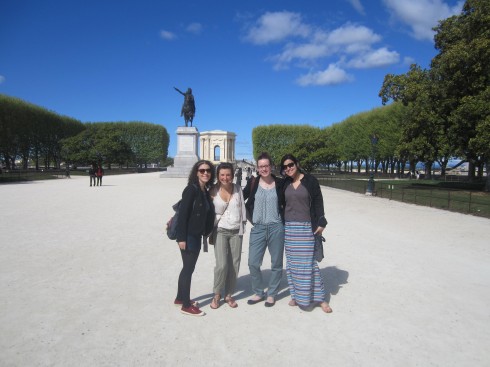
With my Couchsurfing host’s friends in Montpellier, France
House sitting
There are also “house sitting” sites, where you get free accommodation while the owner of the house is traveling, in exchange for keeping the house in good condition and often taking care of their pets. Some examples are Mind My House, Trusted House Sitters, HouseSit Match and House Carers.
This is one of the best ways to travel for free for long periods of time.
Your personal contacts
One of the ways I used the most to travel without paying for accommodation was by activating my network of contacts. In this globalized world, it is very likely that you have a contact in another city or country who is available to welcome you.
To find that out, just ask your friends and relatives who live in other places if they have a space for you on the sofa at home or know someone who does.
Social media
Another way to use or expand your contact network is through social media. You can ask on Instagram stories if anyone knows of someone who can welcome you or join Facebook groups that bring together travelers.
Searching for terms like “Couchsurfing”, “Backpackers” and “Travelers” in the Facebook search, you will find several groups with different niches.
People you meet on your trip
You can’t plan this part, but it’s worth keeping in mind to stay open to opportunities, after all, a common accommodation option for those traveling for free is to stay at the home of people they meet along the way.
Of course, you need to use common sense and have your instincts tuned in, especially if you are a woman, but there are plenty of people genuinely interested in helping.
Camping
Haven’t found a place to sleep? A good “plan B” for those who want to travel for free is to take a camping tent. If you are in a nature area, you can look for a place to do wild camping.
If you are in a city, you can ask to camp in a house’s backyard or look for places like gas stations. Ideally, you should talk to residents to find out if there are any restrictions or safety issues that you need to be aware of.
Public buildings
Even without a tent, many people who travel for free end up sleeping at gas stations – even in the bathroom, like my friend Patricia. I’ve already spent a few nights in airports to save money, and train stations and bus stations can also be good options. Once again, I recommend talking to people there to assess whether it is safe.
How to get free food while traveling
The third fundamental issue about traveling without money is food. Unless you’re doing a radical experiment like Aline, whose story I told you above, I recommend having at least some money for food.
But here are some ways to get free meals during your trip:
Work exchanges that include meals
In my opinion, the best way to get free food on your trip is by doing a work exchange and looking for hosts who offer all meals as part of the exchange.
I spent two weeks in the French countryside, in a comfortable private room, with all meals included. It was a lot of food, and of excellent quality – almost all of it planted by them or their neighbors. The hosts even paid for my beer and snacks when we went for a walk. In return, I worked a few hours a day helping with gardening and home improvements. It was one of the coolest experiences I’ve ever had abroad, and all while traveling for free.
Remember that by clicking here or using the coupon JANELASABERTAS you get 10 USD off the annual fee on the Worldpackers work exchange platform.
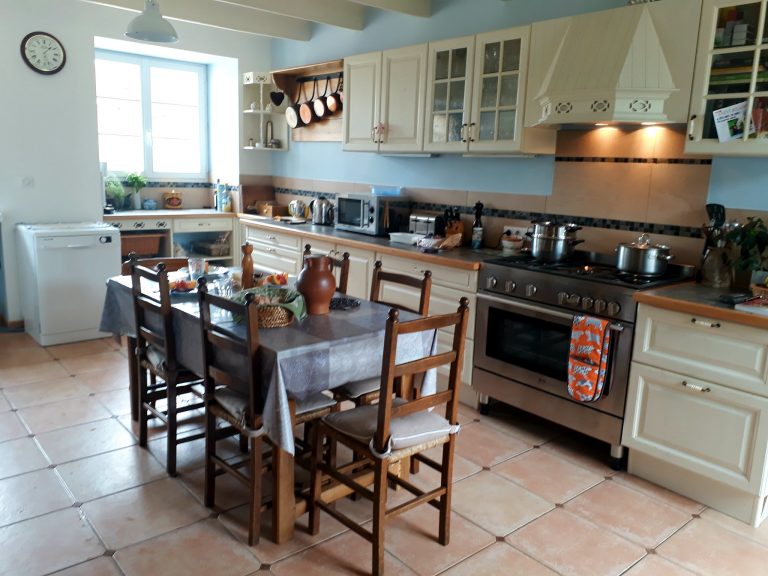
The kitchen where I made dozens of free meals while volunteering in France
Offers from people you meet along the way
If you stay at someone’s house and tell them you’re traveling without money, they’ll probably offer you food. If you feel bad about depending on other people and not having anything to give in return, you can say thank you by cleaning the house or using some skill that is useful to that person, like fixing something.
Food donations
Some backpackers who travel without money have the habit of asking for food from passers-by, stallholders or in restaurants. If you don’t have the courage, you can also offer some small work in exchange for a meal.
Discarded food
Unfortunately, there is a lot of food waste in our society. Markets, fruit and vegetable stores, bakeries, and restaurants often throw away food that is not in perfect condition. I met some travelers who didn’t have money or wanted to save and went to these establishments to ask for discarded food.
What people usually do is go to places at closing time and ask if there is anything left that they will no longer sell. In the case of markets and fruit and vegetable markets, food is generally replenished early in the morning. If it’s a restaurant or bakery, you can look at the opening hours and go there just before closing.
How to find free things to do on the trip
Those who wonder how to travel for free often think that they won’t be able to do many interesting things because they can’t pay for them. However, in the vast majority of places there are many free attractions.
Parks, squares, monuments, interesting buildings, some museums, and street concerts are among the things you can enjoy without money. Especially in times of good weather, when you can spend time outdoors, you can do a lot of things for free. Search online and ask the locals and you will certainly find many options.
It’s worth remembering once again that traveling without money or saving as much as possible involves approaching the trip in a different way than a regular tourist.
Even if you can’t go to the most visited tourist spots in that place, it’s okay, because the idea is precisely to see the destinations beyond what is made for tourists. Connect with people, experience everyday life and your travel experience will certainly be very rich, even without a penny in your pocket.
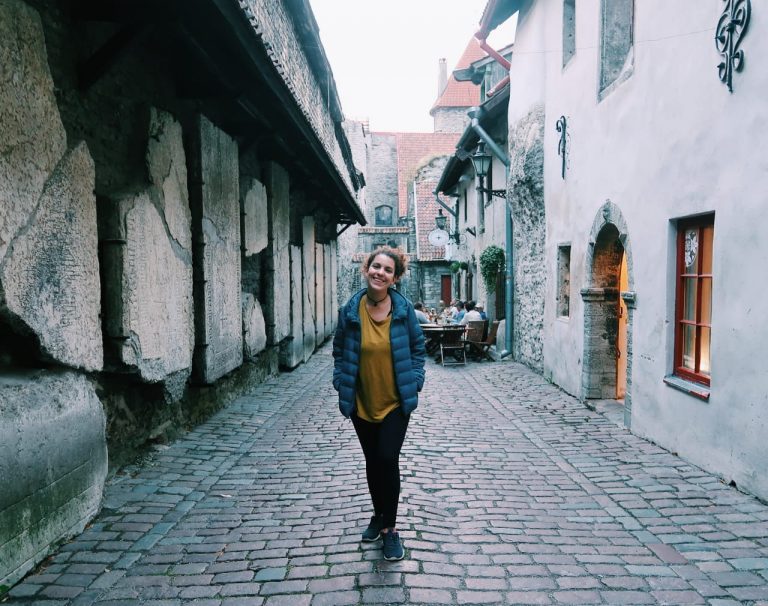
Walking the streets of a new city is free – and a lot of fun
Final tips on traveling for free
Learn the basics of the local language
Even if you go abroad, you can often get around speaking English or using your creativity, hand gestures and a translation app. But knowing a few words in the local language helps you make connections and prompt sympathy from residents towards you, as well as making it easier to ask for help if you go through trouble.
Try to keep a good mood
On a trip with no money or very little money, some uncomfortable situations will inevitably occur. Maintaining a good mood whenever possible is important both to make the experience more pleasant and to be able to create connections with people.
The people I know who traveled for free used different strategies, but they all agree on one thing: being friendly and smiling makes a big difference.
Have an emergency fund
As incredible as the experience of traveling for free or with very little money can be, we cannot deny that being able to pay your way out of difficult situations is a source of security. Even if you want to travel cheap, it’s important to have an emergency fund. Take some money or a card that you can use in case of need.
Trust your instincts
Even though the world is not as dangerous as the media makes it seem, there are obviously people with bad intentions out there. In addition to all the safety tips you can adopt, such as having internet on your phone to ask for help or letting someone you trust know where you are, an important factor is listening to your instincts. If a situation seems dangerous, try to get out of it as soon as possible.
Don’t neglect your health
In addition to safety, another point that deserves attention is your health. I recommend doing a medical check-up before traveling, packing any medicines you usually take and trying to eat well. If you are going abroad, it is also important to get travel insurance.
Even if you want to travel for free or with as little money as possible, consider that if you have a health problem or accident in another country and you don’t have a travel or health insurance you may not be able to get care or end up in debt.
One of the best cost-effective options in this regard is SafetyWing’s, Nomad Insurance, which is perfect for people who are always on the road and need flexibility and peace of mind. This Norwegian company was created by digital nomads to cater for the needs of people who never know where they’ll be next week.
They recently launched Nomad Insurance 2.0, includes new add-ons that make it even more appealing. For more information, read my full article about this travel insurance for digital nomads or check out their Frequently Asked Questions page. If you’re ready to get covered, click here.
Still have questions about how to travel for free? Send them in the comments section!
Disclosure: This isn’t a sponsored post, but I’m on SafetyWing and Worldpackers affiliate programs, which means that if you sign up using the links on this article, I’ll get a small commission that helps me keep this blog up and running and you won’t pay anything extra. Thank you!




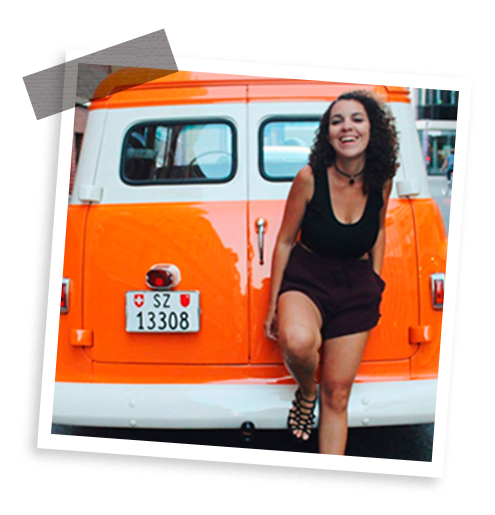




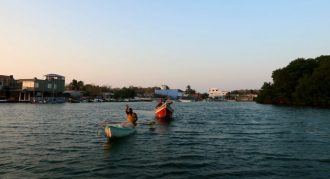





0 Comentários